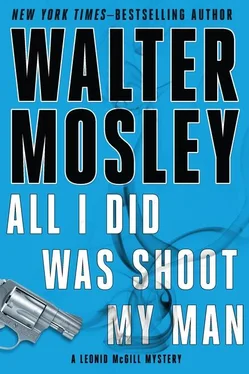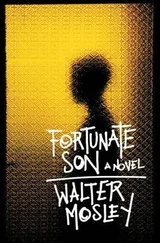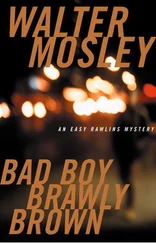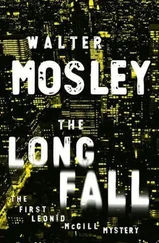Elsa Koen was the private nurse that Katrina had hired for Gordo when he came to stay with us while being treated for stomach cancer. At the time we thought that he had come to us to die.
The German nurse had fallen in love with the old guy even though she thought he was nearly homeless.
“What happened?” I asked.
“I told her about my properties.”
“Plural?”
I had always thought that Gordo rented the fifth-floor gym. There was a property supervisor and everything. It turned out that he owned the entire building; fifteen stories in lower midtown Manhattan.
“Yeah,” he said. “I got two more buildings three blocks up.”
“Fully rented?”
“Yep. Skidmore manages them too.”
“Damn. So, so you told Elsa about that and she just said she was leavin’?”
“Uh-huh.”
“There had to be sumpin’ else. You want a prenup or somethin’?”
“No. I told her what’s mine is yours.”
“Damn.”
“Talk to her for me, will ya, LT? Elsa respects you.”
The full range of sadness showed on Gordo’s face. But it wasn’t the grief that moved me. Gordo never asked anybody for anything. He was a boxer that lived by the philosophy that you didn’t admit defeat — not ever. You might get knocked on your ass, but even then you used every ounce of strength you had to try and beat the count.
“Okay,” I said.
The stairway to Gordo’s illegal fifteenth-floor apartment had a small window at every landing. These looked west on Thirty-fourth Street toward the Hudson River. I took the steps two at a time to make up for the exercise I hadn’t done in the gym.
Gordo’s door was ajar.
I knocked anyway.
There was no answer so I went in.
“Hello?” I said. “Elsa?”
The rabbit warren apartment must have had eleven rooms but it took up less than twelve hundred square feet. The ceilings were low, and many rooms didn’t have windows.
I found Elsa in a tiny windowless chamber that contained a dirty cream-colored sofa and a portable TV. There were three pale blue suitcases sitting in front of her. She’d been crying.
“Elsa.”
She looked up at me, letting her head tilt to the side.
“What’s wrong, honey?” I asked.
She opened her mouth but words were temporarily unavailable.
The nurse had red hair and pale skin. She wasn’t beautiful but she was fair — in every way.
I sat down next to her and she hugged me.
“Tell me about it,” I prompted.
She let go and tried to find something to do with her hands.
“I don’t know,” she said at last, clasping her palms together tightly between her knees.
She was wearing a plaid skirt and a black T-shirt, no stockings or socks, and white nurse’s shoes.
Elsa hadn’t been in her forties for very long, and she looked younger still.
“Gordo told you about his property,” I said.
“Why?”
“Why what?”
“Why did he lie?”
“He didn’t.”
“He should have told me before we, we got together.”
“Maybe he should have but he couldn’t — that’s a fact.”
The words were said with such certainty that Elsa got suddenly intent.
“Why not?” she asked.
“When you moved away from your parents’ house it was already the nineties, right?”
“What does that have to do with anything?”
“When Gordo was born we were in the Great Depression,” I continued. “That was back when a black man never owned anything that a white man couldn’t take from him. Back when they could put up signs that said ‘White Only.’ ”
“So? It’s not like that anymore.”
“That’s true, things are different today. When young people like you look at the world you see trouble but not like the mess Gordo’s seen. He learned to cover up early on. I didn’t know about all of what he owned until a few minutes ago.”
“You? But you’re his best friend.”
“You can leave him, Elsa, but be sure about it. He’s a good man and he loves you. You are the only reason he survived that cancer. All three of us know that.”
I left Elsa pondering the pedestrian and impromptu history lesson.
One thing I know, Trot, my father once said. You can’t be in love with a woman and practice Revolution at the same time.
But don’t you love Mama? I asked fearfully.
I do, surely. But not when I’m doin’ Revolution.
I don’t understand, Daddy.
When I’m with your mother, he said, she’s the only thing in the world. There is no economic infrastructure or class struggle. When it’s just me and her it’s husband and wife — that’s all.
That was one of the many fragments of conversation that had clattered around in my head for decades. Walking down the stairs, I realized that what I learned from my father was not what he had meant. He wanted to make me a better soldier, but I, slowly and over time, came to believe that men were not only alienated from their labor, and therefore from one another, but they were also, in a similar way, alienated from themselves by the passions they felt pitted against the things they had to do.
I was at the exit door on the first floor before I knew it. I meant to stop by the gym to tell Gordo what had transpired but, at the threshold of the street, I thought that there was really nothing to say. Either Elsa was going to leave or she wasn’t. When G went upstairs he’d find out for himself. I’d talked to her like he wanted me to but there was no telling what her decision would be.
I found myself walking east on Thirty-third. I was in trouble but it didn’t seem too bad. Rutgers would probably put some pressure on me but I knew how to push back.
The cell phone throbbed against my left thigh. I pulled it out and saw that it was Aura calling. I wanted to flip the phone open but my thumb refused. The vibrations ceased and the little green light of the display faded to black. It felt like watching something die.
I had stopped walking and stood there on the busy thoroughfare, feeling something close to grief over a missed phone call.
Then the screen lit up again.
It was Aura.
“Hello?” I said.
“Why didn’t you answer?” she asked.
I tried to find the words to lie but they evaded me.
“What’s goin’ on, babe?” I asked.
“I miss you calling me baby.”
It wasn’t just lies that escaped me, I couldn’t tell the truth either. I wanted to say how much I loved her, how that love had disappeared like it had with my father when he was being a soldier and not a husband. The feeling struck like an unconscious memory roaring into existence, necessarily unexpected and painful like plague boils erupting from glands deep in the neck.
“Um,” I said.
Aura laughed.
“Leonid?”
“Yeah... Yes, Aura.”
“I know that I’ve been stringing you along. It isn’t, hasn’t been fair, but I didn’t know what else to do. I was stuck. I love you so much but you scare me.”
A horn honked. For some reason that sound made me aware of a woman ranting almost incoherently on the corner a dozen yards away. People were hustling around, moving to the beat of their happenstance lives. This all seemed proper. Life was a cacophony, I’d always known it. Every once in a while there was a piece of beautiful music amid the dissonance, but lucidity was a danger in an irrational world — my father had taught me that too.
Aura made sense. She said that I frightened her.
“Leonid?”
“Yeah.”
“Are you going to talk?”
“... mothahfuckah try an’ tell me what to do,” the ranting woman cried, “but he don’t even have a appendix...”
Читать дальше












